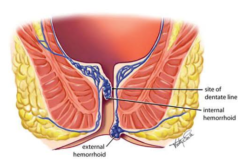
Hemorrhoids are a common condition during pregnancy, affecting many women. They are swollen and inflamed veins in the rectum and anus that can cause discomfort and pain. While the exact cause of hemorrhoids during pregnancy is not fully understood, several factors can contribute to their development:
Increased Pressure
During pregnancy, the growing uterus puts pressure on the pelvic veins and the inferior vena cava, the large vein on the right side of the body that receives blood from the lower limbs. This pressure can lead to the enlargement of the veins in the rectum and anus, resulting in hemorrhoids.
Hormonal Changes
Pregnancy hormones, such as progesterone, can relax the walls of the veins, making them more prone to swelling and inflammation. This hormonal effect can contribute to the development of hemorrhoids.
Constipation
Constipation is a common problem during pregnancy, often due to hormonal changes and the pressure of the growing uterus on the intestines. Straining during bowel movements can put additional pressure on the veins in the rectum and anus, leading to hemorrhoids.
Increased Blood Volume
During pregnancy, the body produces more blood to support the growing fetus. This increased blood volume can also contribute to the development of hemorrhoids, as it puts more pressure on the veins.
Symptoms of Hemorrhoids
Symptoms of hemorrhoids during pregnancy can vary from mild discomfort to significant pain. Common symptoms include itching, irritation, and swelling around the anus, as well as pain during bowel movements. Some women may notice small amounts of bright red blood on the toilet paper or in the stool, indicating bleeding hemorrhoids. In more severe cases, a lump may protrude from the anus, known as a prolapsed hemorrhoid, which can require medical attention. Recognizing these symptoms early can help in managing and alleviating the discomfort associated with hemorrhoids during pregnancy.
Treatment and Prevention
Effective management and prevention of hemorrhoids during pregnancy involve a combination of lifestyle modifications, dietary changes, and home remedies. Increasing dietary fiber intake through fruits, vegetables, and whole grains can help alleviate constipation and reduce straining during bowel movements. Staying hydrated by drinking plenty of water also aids in softening the stool. Regular, moderate exercise, such as walking or prenatal yoga, can enhance bowel function and improve circulation. When necessary, over-the-counter treatments like witch hazel pads or hydrocortisone creams may provide temporary relief from itching and discomfort. It's important for pregnant women to consult their healthcare providers before using any medication to ensure it is safe for both mother and baby. By adopting these preventive measures, the incidence and severity of hemorrhoids during pregnancy can be minimized, improving overall comfort and well-being.
When to Seek Medical Attention
While many cases of hemorrhoids during pregnancy can be managed with home remedies and lifestyle changes, there are situations where medical attention may be necessary. Pregnant women should contact their healthcare provider if they experience severe pain or excessive bleeding or if they notice a large lump protruding from the anus that does not retract. Additionally, if symptoms persist despite home treatment or if there are concerns about possible complications such as infection or thrombosis, professional medical evaluation is essential. Early intervention can prevent more serious issues and ensure both maternal and fetal health are not compromised.
Conclusion
While hemorrhoids during pregnancy can be uncomfortable and painful, they are usually temporary and can be managed with lifestyle changes and over-the-counter treatments. It's essential to maintain good bowel habits, stay hydrated, and eat a high-fiber diet to prevent constipation and reduce the risk of developing hemorrhoids. If you are experiencing severe or persistent symptoms, consult your healthcare provider for further evaluation and treatment options.
